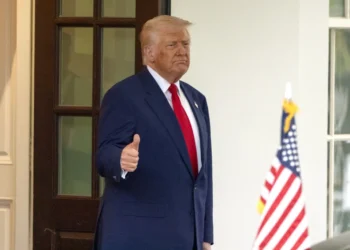British politician Dennis Healey wisely advised, “When you’re in a hole, the first rule is to stop digging.” The national debt might be the world’s deepest grave, surpassing $36 trillion with a deficit projected at $1.3 trillion for this fiscal 2025 alone. It’s no wonder Americans cast aside career gravediggers in both parties and elected a private sector builder to tame bureaucratic bloat.
With the U.S. now spending more on interest on the debt than on national defense, our national security, along with our moral obligation to our children and future generations, requires tough, belt-tightening decisions. Ensuring public safety and a fair justice system is, unlike much of what government does, a core function, but it cannot be sacrosanct from the imperative to streamline government.
For this reason, the administration’s controversial decision to cancel about 350 Department of Justice grants initially valued at more than $800 million was a step toward righting our fiscal ship by focusing spending on carrying out the federal government’s enumerated powers specified in the Constitution.
The canceled programs, many of which involved non-profits in partnerships with local and state criminal justice agencies, fall into two categories. The first, much smaller one encompasses activities that are wasteful or inconsistent with conservative principles. Most of the funds, though, fall into the second category, underwriting commendable efforts that state and local governments should support to prevent street crime and help victims in cases prosecuted in state courts. But such work is unmoored from the limited role in addressing crime that the Constitution gives the federal government.
In the first category, Attorney General Pam Bondi noted one of the terminated grants directed $250,000 to provide gender-affirming care and gender-appropriate housing for incarcerated transgender individuals. Similarly, on May 2, President Donald Trump released his proposed budget, which wisely proposes eliminating a $2 million grant to a Puerto Rican nonprofit organization that focuses on addressing “structural racism and toxic masculinities.”
What’s toxic is the runaway growth of the federal footprint in criminal justice. In 1790, Congress designated 23 federal crimes, including piracy on the high seas, counterfeiting, and murder on federal property. However, today there are more than 4,000 federal crimes on the books, many of which the Heritage Foundation has explained do not adhere to the constitutional framework that confines the federal role to national security, activities that cross state lines, and conduct on federal property.
While federal grants do not directly conflict with state laws, they also undermine federalism because such funding is a loaded weapon that has been used by administrations of both parties as leverage to strong-arm state governments. For example, the Biden administration withheld Title X grants from Oklahoma because it did not include access to abortion in its counseling services for women.
We can limit the opportunity for such abuses by narrowing grant funding in all areas to activities that support the constitutional responsibilities of the federal government. In criminal justice, this includes combating crimes that cross state or international borders (e.g., human and drug trafficking) and crimes on federal property, as well as delivering reentry programs for federal prisoners. There is also a federal role in supporting research initiatives to identify practices that prevent crime and reduce reoffending, but these efforts should be designed to promote organic replication as opposed to becoming perpetual federal expenditures.
National-level grants that provide economies of scale, such as hotlines for domestic violence and human trafficking victims, also make sense. But most localized grants, even worthy ones that seek to prevent street crime through violence interruption and provide technical assistance to state and local corrections agencies, simply don’t fall within the scope of the federal government’s limited constitutional role.
Making this necessary transition is challenging and requires time for states and municipalities to fill the gap, even though $350 million in grants is only about 1% of the more than $300 billion this country spends on criminal justice every year, mostly at the state and local levels on policing, courts, and incarceration. To its credit, the Trump administration has already restored seven grants where the activities, such as victim hotlines, were consistent with its goals of fighting crime and aiding victims. As appeals by grantees are reviewed, more restorations may, and probably should, follow.
Moving forward, Congress should revisit the structure of federal criminal justice funding. This could include converting certain grants into block grants or requiring state matching funds. States are far better positioned to identify local needs, avoid redundancy, and track outcomes.
TRUMP HAS SLOWED NATIONAL DEBT GROWTH BY 92%
Ironically, red states have demonstrated that resource constraints can drive innovation and efficiency. In the past 15 years, states such as Texas, Georgia, South Carolina, and Oklahoma moved away from building budget-busting prisons and instead pioneered cost-effective reforms that prioritize public safety and rehabilitation. These states provide a blueprint for how criminal justice can be done smarter without relying on an ever-expanding federal apparatus.
We must keep right-sizing the criminal justice system while returning primary responsibility for this vital function to its proper place — at the state and local level, where it is most accountable to those it serves. The Constitution demands it. Fiscal reality compels it. And the people deserve nothing less.
Timothy Head is President and CEO of Unify.US, former Executive Director of the Faith & Freedom Coalition, and Vice Chair of the Council on Criminal Justice Board of Directors.

















